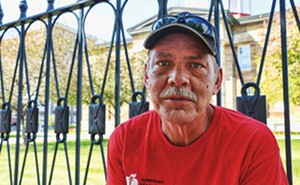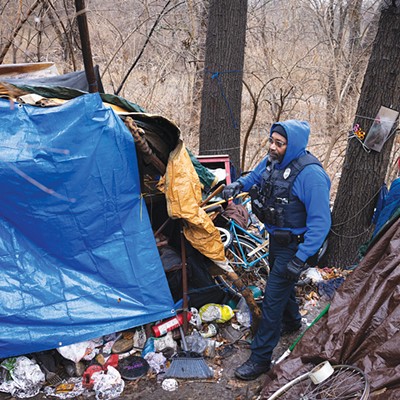Guyer’s story is one of injustice, heartbreak and determination. Although he ultimately climbed out of homelessness, he says he’s an exception, and more must be done to help others do the same.
William Guyer, 51, says he originally became homeless after his mother was diagnosed with an advanced case of cancer. Guyer took a leave of absence from his job at the time to stay with her in Kentucky and care for her until her death. When he returned, he found his apartment trashed, with most of his belongings lost or stolen. Shortly after that, he developed a painful hernia that prevented him from working. The hernia eventually began to bulge visibly through the skin of his abdomen.
“It was horrible,” Guyer said. “I couldn’t lift a toothpick.”
After spending about a year living on the street, Guyer underwent surgery for his hernia and found a job even before his doctor cleared him to work. He now works for a moving company in Springfield and lives near downtown.
While Guyer was homeless, he met Springfield photographer Adam Smith, who is producing a documentary on homeless people in Springfield. The pair struck up a friendship over their mutual love of playing guitar, with Guyer, a talented musician, borrowing Smith’s guitar to practice his songs. Smith says Guyer was determined to end his homelessness from the start.
“When I first met him, he said, ‘I’m going to get back on my feet, and when I do, I’m going to have a guitar in my hand,’ ” Smith said.
Guyer made good on both promises, recently buying a guitar that he uses while busking in downtown Springfield.
Even those who do find work don’t necessarily make enough to get off the street, Guyer said.
“If you’re making 40 or 50 bucks a day, it doesn’t go very far in today’s society,” Guyer said. “It’s not like you can make long-term plans with that. If you’re good and keep your hopes up, you can sit there and grind in that same spot, but if not, you fall. You say, ‘To hell with it.’”
The hardest part of being homeless, Guyer says, is the loneliness.
“You feel ignored by everything and everybody,” he said. “It’s desolation. It’s easy to fall into despair, which is what most homeless people do. Some of these people have been doing this for years, and they never come out of it. You just give up.”
Guyer hopes to save enough money to buy a used car and move to a nicer house, but he says being homeless changed his perspective on life and his reliance on material things.
“I just cashed my paycheck, but being homeless made me realize that I don’t need all this money,” he said. “I don’t even know how to spend it. I used to smoke only Marlboro cigarettes; that was my thing. But I remember picking up cigarette butts off the ground when I was homeless. Now I realize it’s not important; things change.”
Contact Patrick Yeagle at [email protected].





















